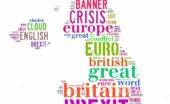Molly Minturn - My family is heartbroken to share that my father died in surgery on Monday, Feb. 10. It…
Wednesday Night #1923
Written by Diana Thebaud Nicholson // January 23, 2019 // Wednesday Nights // Comments Off on Wednesday Night #1923
Davos 2019 is on, albeit missing some of the political superstars, including Justin Trudeau, Emmanuel Macron, Narendra Modi, Theresa May and the entire U.S. delegation. [See Davos becomes a liability in the populist era] Never mind, the presence of Jair Bolsonaro, the new Brazilian president, compensates as a disruption.
On Monday, the IMF released their annual Global Outlook which did not do a lot to cheer up the delegates.
Suggested reading: Shaping global architecture in an era of fortresses and walls by Sebastian Buckup, Head of programming, WEF.
Why press freedom should be at the top of everyone’s agenda by Stephen J. Adler, Editor-in-Chief, Reuters.
A brief history of globalization by Peter Vanham, Media Lead, US and Industries, World Economic Forum
Finally, a somewhat more light-hearted look at Davos: 10 things you didn’t know about Davos
As the U.S. celebrated Martin Luther King Day on Monday 21 January (it is a moveable date as it occurs on the third Monday in January), in France the date had a very different significance – the 226th anniversary of the decapitation of Louis XVI – a curious date for President Emmanuel Macron to host dozens of the world’s most powerful executives at a pre-Davos dinner at Versailles. Making the best of it, his message to the guests was that he would not follow the path of guillotined French royals and would continue to reform the French economy despite a sometimes violent popular revolt. Presumably, dinner cost less than the expense of taking his entourage to Davos.
Meanwhile, in the UK, Theresa May continues to fight the good, or not-so-good, Brexit fight as Parliament plots to wrest control of the process for leaving the European Union. Jeremy Corbyn is in full cry, now backing a plan that could trigger a second referendum. Labour Calls For Vote That Could Spark Second Brexit Referendum. So far, the only good thing to come out of this tiresome impasse is ‘Order! Order!’: Parliament Speaker Is Brexit’s Surprise Star and Villain
It has been confirmed that the U.S. will proceed with the formal request to extradite Huawei executive Meng Wanzhou before the deadline of 30 January. After receipt of the formal request, lawyers with Canada’s Department of Justice’s International Assistance Group must determine within 30 days whether an “authority to proceed” will be issued. This authorizes an extradition hearing to be held before a judge of the Superior Court where the court will consider whether the arrested person should be extradited. Canada cannot refuse to issue this “authority to proceed” if the United States’ request complies with the requirements of the Canada-U.S. extradition treaty.
For the security of Canadians, Huawei should be banned from our 5G networks because the security risk is too great writes Richard Fadden, former national security adviser to the PM. He adds “the evidence for banning Huawei from 5G continues to pile up. Poland’s Internal Security Agency has arrested and charged a Huawei employee with espionage. And recent news media reports reveal U.S. authorities are pursuing a criminal investigation of Huawei for stealing trade secrets of U.S. firms. Our allies have got the message. New Zealand, Australia and the United States have already announced they will ban Huawei from participating in their next-generation mobile data networks. Britain has not yet formally banned Huawei, but its main telecom company, BT Group, has announced it will be stripping Huawei from its 3G and 4G operations and banning it from its 5G network.”
In light of these recent developments, Canada: Alone in the World?, the CIC event on February 7 with Robert Greenhill, Executive Chairman of the Global Canada Initiative, and Ben Rowswell, president of the CIC and former Canadian diplomat is of huge relevance. Registration is a MUST.
The world is fretting about the U.S.-China trade confrontation. However, Wednesday Night’s two Davids write this week about China’s treatment of the Uyghurs. There is no disagreement between the two authors, only a difference in emphasis; David Jones gives a somewhat broader historical context in The Uyghurs Versus China , while in Beijing’s Mass Internment of Uyghurs David Kilgour draws parallels with treatment of the Falun Gong and also points to the conclusions of a human rights subcommittee of Canada’s House of Commons which studied the Uyghur situation.
News from a number of African nations is not good. However, Brookings offers the Foresight Africa 2019 report which explores six overarching themes on the triumphs of the past years as well as strategies to tackle the remaining obstacles for Africa. We highly recommend the chapter on bolstering good governance.
So much in the news about those suffering from the shutdown [see U.S. Government & governance 2019], but if I were Trump, these are the people I would really be worried about: Secret Service maintains mission in face of shutdown, but lack of pay hurting morale – above and beyond the call of duty.
Rather than focussing on all the awful news from Washington, do read A Built-From-Scratch Neighborhood in Washington That Doesn’t Feel Prefab about what sounds like a tasteful, appropriate and attractive redevelopment of one of the seedier parts of the city.
Gloomy economic/investment news
Some of you will remember Peter Berezin’s engaging BCA colleague, Jim Mylonas, global macro strategist at BCA Research. We were happy to see him quoted (Bloomberg via The Gazette) but not too thrilled with his prediction Canada’s economy may soon endure something it hasn’t faced in 68 years: BCA Research “I think we’re just on the precipice of embarking on a serious recession. It’s not a matter of if, but when.” He is convinced that the surge in household debt combined with rising interest rates will push the Canadian economy into recession, even while the U.S. economy continues to grow, noting that Canadian recessions without the U.S. in the same boat are rare.
John Bogle, the creator of the index fund, died last week aged 89. Mr Bogle’s invention may have helped investors save $1trn in fees. That makes him the creator of the most useful financial innovation of recent decades, notes The Economist. That’s the good news. The down side – there always has to be one, doesn’t there? – is that the relentless rise in index funds’ popularity has raised concerns. Even Bogle acknowledged some recently. “Public policy cannot ignore this growing dominance, and consider its impact on the financial markets, corporate governance, and regulation,” he wrote in the Wall Street Journal in November. “These will be major issues in the coming era.” Now that index funds and similar exchange-traded funds hold roughly $6.7 trillion, or 35 percent of long-term fund assets, concerns are rising that the products may reduce competition, distort markets, or prove too deferential to management and corporate directors.(Bogle’s legacy: Booming index funds with perhaps too much reach)
Amidst the wailing about the extraordinary weather of the past days, a timely reminder from The Atlantic that individual record cold days during any given year don’t erase decades of rising averages: The average time, for instance, between the last frost of spring and the first frost of fall has increased in every region of the U.S. since the early-20th century. A reminder, also, that both planetary warming and local emissions can dramatically alter a region’s weather patterns, and an entire region’s identity and way of life.
The tragic death of Gilles Duceppe’s mother during the past weekend’s unprecedented combination of snow and cold is now the subject of a coroner’s inquest. Sad to say, were she a homeless person, or even a relatively unknown individual, who had frozen to death, the case would not have attracted the public (read political) outcry that it has. Her death will not be in vain if the authorities take the issue seriously and bring in sensible corrective measures to protect all individuals from such avoidable deaths. We recently had two successive (false) alarms – nobody checked individual apartments to see if the occupants had complied.
Something else to worry about
Tech writer suggests ’10 Year Challenge’ may be collecting data for facial recognition algorithm
Facebook’s ’10 Year Challenge’ Is Just a Harmless Meme—Right?
Through the Facebook meme, most people have been helpfully adding that context back in (“me in 2008 and me in 2018”) as well as further info, in many cases, about where and how the pic was taken. Thanks to this meme, there’s now a very large dataset of carefully curated photos of people from roughly 10 years ago and now.
I’ll offer three plausible use cases for facial recognition: one respectable, one mundane, and one risky.
The benign scenario: Facial recognition technology, specifically age progression capability, could help with finding missing kids. Facial recognition’s potential is mostly mundane: Age recognition is probably most useful for targeted advertising. … [However] Like most emerging technology, there’s a chance of fraught consequences. Age progression could someday factor into insurance assessment and health care.
In the give-me-a-break file:
Why Quebec Isn’t Interested in Anglo Lectures About Cultural Appropriation
English-speaking members of Canada’s Indo-Canadian community found a sketch parodying Justin Trudeau’s (hilariously) disastrous 2018 trip to India hard to swallow. In that two-minute segment, an actor portraying the Canadian Prime Minister is shown smoking a joint (which is now legal in Canada) and drifting away to a psychedelic world full of clichés about India. He first turns into a Bollywood dancer and then into a snake charmer—with the reptiles in question turning out to be fuel nozzles (a reference to the ongoing controversy over pipeline construction in Western Canada).
… What Quebec viewers saw was a sketch that ridiculed how the prime minister had gone overboard in his embrace of traditional Indian clothing and dance. The joke was on the PM, not on India, on Indians or or Indo-Canadians. Yet that was not how some Anglophones saw it.
“This video is completely disrespectful to our cultures,” declared the founder and director of the Indian cultural troupe Bollywood Blast, Ina Bhowmick. “I won’t say that in itself it’s racism, but doesn’t it come from a racist way of thinking? Yes,”
On a lighter note: Australia’s national day in late January is known for barbecues (called sausage sizzles), backyard cricket and… an annual video produced by the country’s lamb industry. The advertisements are lighthearted but provocative, addressing issues including racism. This year’s effort pokes fun at domestic politics and sporting controversies and then asks if Australia would do better by uniting with the much smaller – but better performing – New Zealand. It’s apparently being well received in Australia, but Kiwis say they are just fine on their own.
On the other hand, Bloomberg tells us that The Super Rich of Silicon Valley Have a Doomsday Escape Plan. Seven Silicon Valley entrepreneurs have purchased bunkers from Rising S Co. and planted them in New Zealand in the past two years, said Gary Lynch, the manufacturer’s general manager. At the first sign of an apocalypse — nuclear war, a killer germ, a French Revolution-style uprising targeting the 1 percent — the Californians plan to hop on a private jet and hunker down, he said.


